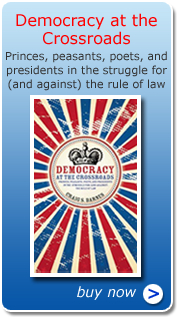Millions of Americans are today unemployed because the free market is not working for them. Millions of Americans have lost their homes because the free market did not work for them or for the banks. Before the health care bill passed last January millions could not get health care because the free market worked for them when they were healthy but often did not work at all when they needed care.
The free market sent jobs to China and Mexico, India and Taiwan. The free market encouraged subprime mortgages and collateralized debt obligations that were collages of numbers that the market itself did not understand. The free market encouraged insurance companies to compete for ways not to pay for health care rather than to encourage ways to provide health care.
During the years of the Bush administration’s free market advocacy, Bear Stearns collapsed, Merrill Lynch failed, and Lehman Brothers collapsed. The free market enabled Goldman Sachs to act as if it believed in securities that it sold to others while at the same time betting with its own money that these securities would fail. To knowingly induce buyers with misinformation is intentional fraud, but the free market did not and has not ever protected against intentional fraud.
In a free market, British Petroleum risked environmental catastrophe in order to save money on expensive cement or time-consuming testing and used cheaper designs rather than safer ones for the most complex drilling apparatus in the world. Transocean obeyed the demands of the market by not fixing 390 maintenance items that were back-listed, ignored a leak in the control pod of the blowout preventer, and avoided the delay caused by its gas detection alarms by simply shutting them off.
Now come Rep. John Boehner of Ohio and Sen. Mitch McConnell of Kentucky leading the Republican charge toward the fall elections urging Americans to once again undo government regulation and rely for their protection and safety, their jobs and their health care on the free market. They would undo newly passed protections against free market fraud and against incentives for health care providers and against more regulation of Wall Street.
The fall campaign is therefore shaping up as a contest of slogans urging voters to choose between the free market and big government. Republicans are hoping to evoke old stories of freedom and liberty, Paul Revere and individualism. Big government, they say, is the opposite of all these and the free market is the way to be truly American.
The Democrats respond: “Wait a minute! The free market has led to outlandish gaps between the wealth of the rich and that of the rest of us Americans; it provides yachts and golf vacations for the rich and foreclosures and joblessness for the middle class! Hold on! The rich are not the only ones who count!”
But Democrats have not found a symbolic spokesperson for that cry. President Obama seems reluctant to lay down the gauntlet or to use his oratorical skills to shame the arrogant, make mad the guilty, or cow the slanderous. Perhaps he is afraid that becoming the passionate spokesperson for sufferers, workers, the destitute and the ill would open him up to the attack that he is just protecting his own. He acts as if his personal background keeps him from letting fly passionate rhetoric lest he be accused of being all for blacks or all for the poor which he supposes would lose him the support of everyone else.
Boehner and McConnell hammer away at big government, not admitting the bald truth that the opposite of government is free market gambling, recession, underfunded schools, fewer police and firemen, less money for science and China buying up American debt. Democrats have yet to find those voices who will sing with pride that the opposite of bonuses and corporate tax breaks is the undeniable reality that Americans will succeed all together or not at all, build bridges and schools together or not at all, curb our appetites for carbon fuels together or not at all, do science and research as our common endeavor, heal the sick as our common need, and sing our common future or not survive at all.
